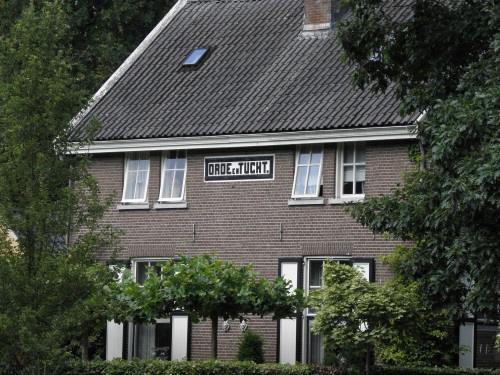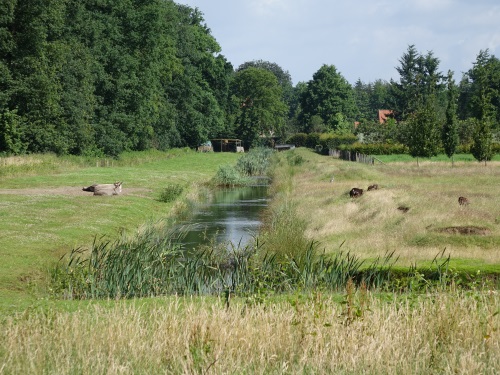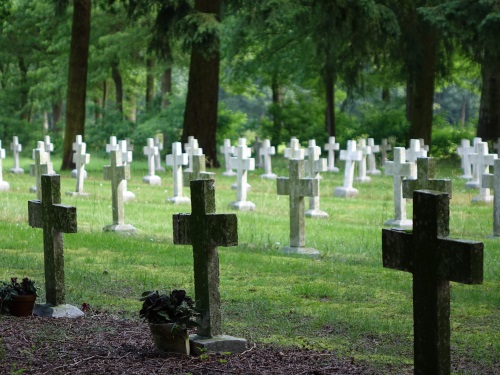Between 1815 and 1830, the current states of the Netherlands and Belgium were united for a short period in the ‘United Kingdom of the Netherlands’. They are now working on a
joint nomination for 2018 to highlight a specific experiment of that era: the efforts of the so-called ‘Society of Benevolence’ to “improve the inhumane conditions suffered by many of the poor”. The Society established domestic colonies to reeducate paupers (tramps, orphans, down-at-heel families) by means of land reclamation and agricultural innovation.
 |
| "Order and Discipline", the Headmaster's House in Veenhuizen |
The
Dutch part of this nomination covers 6 separate locations in 3 clusters, all in the northeast of the country known at the time as the ‘Dutch Siberia’. I visited most of these already in 2011, when I did a whirlwind summer tour along the sites on the Dutch Tentative List. The best known of the colonies is Veenhuizen, a name tied to its large prison that can hold 1,000 inmates (nowadays filled for 25% with prisoners 'on loan' from Norway by the way). An impressive square former prison building holds the disappointing Prison Museum. Walking around town, the most remarkable sights are the edifying nameplates on the houses of the former guards. They hold slogans like "Order & Discipline" or "Work & Pray".
Last weekend I decided to visit the
Belgian part of this nomination. It consists of two locations, Merksplas and Wortel, two villages just south of the Dutch-Belgian border. They’re not as remote as the Dutch sites, but driving along the cobblestoned access avenues does give you a feel that you’ll arrive somewhere special. Like Veenhuizen, Merksplas and Wortel still are known for their large and active prisons.
 |
| Shaping the landscape, Merksplas |
Beforehand I had downloaded a 11km long hiking route, aptly named "Escape Path", through Merksplas Colony. The trail starts at the former Vagrants Chapel, a recently renovated example of eclectic architecture. Roman-Catholicism was the only supported faith in this colony, in contrast to the north where there was 'freedom of religion'. I continued southwards, passing farm fields and following a soggy path through the adjoining forest. It was a very pleasant walk, the landscape reminding me of the area where I grew up in the east of the Netherlands. References to both World Wars are made along the way via a remembrance field of poppies and a memorial dedicated to a fallen British corporal.
After some nice small-talk with a passing shepherd, I ended up near where I had parked my car. I decided not to walk the northern loop of the trail, but to drive directly to the intriguing ‘vagabonds cemetery’. This consists of two open spaces in the forest, where 6,000 former residents were buried from the Colony Merksplas. They only received a simple cross with their number on their grave. Most of them are overgrown now.
The second Belgian location, Wortel, lies just 6 kilometers from Merksplas. The landscape is very similar: neat straight roads and farm fields, still in use. Only the buildings are painted white in Wortel. I found that there is less to see than in Merksplas.
 |
| Vagrants Cemetery in Merksplas |
This nomination has been in the making for years. The Belgians are still finishing the restoration of the large farm structures in Merksplas:
they plan to be ready in Spring 2017, when the buildings will be transformed into a visitor & conference center.
So what will be the chance of success for the nomination? In 2015, the Dutch (who will lead the nomination) organized an ‘evaluation of experts’ to give their opinion on the draft dossier:
They worried about the lack of evidence given of the material impact this colonization has had on nature, how to support the claim that this is a cultural landscape.
Also, a more critical approach of this social experiment would be welcome in the dossier: in the end it was mostly a failure. And how would representatives of poorer countries react to this patronizing approach to eradicate poverty?
To elaborate on the second issue (and they did not foresee this in their evaluation): the former Dutch colony Indonesia will be one of the WHC members to judge. The man behind the Society of Benevolence, Johannes van den Bosch, later became Dutch Minister of Colonies where "he demanded increasingly high financial results from the colonies, often to the detriment of the interest of individual farmers and slaves." (wiki)
Life in the Dutch Pauper Colonies has been immortalized fairly recently in the popular family history Het pauperparadijs , a sad story about coercion, infectious diseases, taking children away from their parents and crop failures.
, a sad story about coercion, infectious diseases, taking children away from their parents and crop failures. , a sad story about coercion, infectious diseases, taking children away from their parents and crop failures.
, a sad story about coercion, infectious diseases, taking children away from their parents and crop failures.